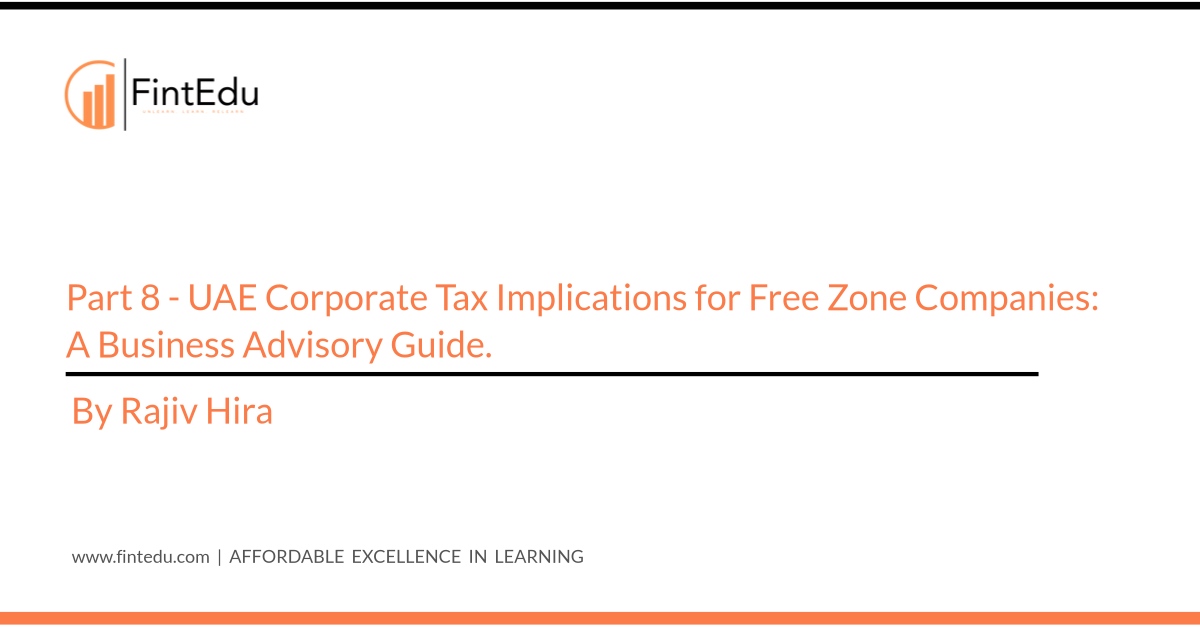LISTEN TO THIS ARTICLE
SME vs Large Corporate Considerations:
SMEs: Smaller and Medium trading businesses often pick Free Zones for ease of setup and 0% tax. Under the new regime, these SMEs face increased compliance (like needing audited accounts, for corporate tax compliance). They must be careful that a few sales here and there to local customers don’t accidentally breach the limits. An SME might be tempted to make an odd sale to a local individual or a non-Free Zone company for extra revenue; however, if such sales form more than 5% of total revenue, the SME could inadvertently lose its 0% tax status. The financial impact could be severe if not monitored. It may be prudent for SMEs to segregate their customer base – e.g. only sell to other Free Zone companies or foreign buyers directly (where operating in commodity trading and / or operating from a designated zone), and refer any mainland customers to a local partner – to preserve their status.
Large Corporates: A large trading or distribution multinational in a Free Zone (say a regional distribution center for a manufacturing MNC) will likely have the resources to structure optimally. Such companies can ensure they are in a Designated Zone facility and do all paperwork and title transfers there to qualify their distribution income for 0%. They might also set up a mainland subsidiary or branch to handle marketing or onshore sales as needed, thereby allowing the Free Zone entity to primarily interact with that related mainland entity. For instance, the Free Zone entity could sell goods to its mainland subsidiary (a Taxable Person) at an arm’s length transfer price, that sale is a Non-Free Zone transaction, but because the activity (distribution from a Designated Zone) is qualifying, the income remains at 0% for the Free Zone company. The mainland sub then on-sells to end customers and pays 9% on its profit. This supply chain structuring can drastically reduce the group’s overall tax, and large corporates are more likely to implement such models. Care must be taken to respect transfer pricing so that profits are appropriately allocated; overly aggressive shifting of profit to the Free Zone entity could attract scrutiny under the arm’s length principle.
Real-World Scenario: Example: Alpha Commodity FZCO, an SME in a non-designated free zone, imports qualified commodity and sells 90% abroad and 10% to UAE end customers. That 10% local part is non-qualifying. If it exceeds 5% of Alpha’s revenue, Alpha would lose QFZP status and pay 9% on its entire profit. To avoid this, Alpha decides to set up Alpha Commodity LLC in Dubai mainland to handle local sales. Alpha FZCO now sells only to the LLC (one bulk transaction), focusing the rest on exports. The LLC pays the standard 9% on its small margin, and Alpha FZCO retains 0% on export income. By restructuring, the SME safeguards its tax benefit. A large corporate would follow a similar strategy but with more formal transfer pricing policies and possibly binding rulings to ensure compliance.
In summary, trading companies should align their operations with the qualifying criteria: use Designated Zones for distribution when possible, avoid direct consumer sales, and separate any onshore-focused business into taxable entities. This ensures maximum profit remains taxed at 0% in the Free Zone entity. Both small and large traders must invest in accounting systems that can track qualifying vs non-qualifying income to manage the 5% (with an eye of AED 5million too) threshold carefully.
Manufacturing Companies
Nature of Business: Manufacturing firms in Free Zones engage in producing or assembling goods, ranging from light manufacturing (e.g. food processing, consumer goods) to heavy or specialized manufacturing (e.g. industrial components, pharmaceuticals), often leveraging Free Zones for benefits like 100% foreign ownership and customs duty exemptions on imported raw materials.
Corporate Tax Nuances: Manufacturing is explicitly a Qualifying Activity under the Free Zone regime. This is in line with UAE’s strategy to promote industrial investment. Key implications include:
- 0% CT on Manufacturing Profits: A Qualifying Free Zone manufacturer can earn income from selling its products and have that be Qualifying Income taxed at 0%, even if the buyers are in mainland UAE or abroad. The rationale is that the act of manufacturing (transformation of goods) is on the approved list, so it doesn’t matter who buys the product, the income qualifies as long as the activity generating it is manufacturing. For instance, a Free Zone factory producing furniture can sell to a UAE retail chain (non-Free Zone person) and still treat the sales proceeds as qualifying income because its activity (manufacturing the furniture) is qualifying and not an excluded activity.
- Distribution vs Manufacturing: One nuance: if a manufacturing company also engages in pure trading of goods it didn’t manufacture, that trading portion might not be qualifying unless it’s incidental or within allowances (de-minimis). A manufacturer should focus on deriving revenue from its own manufactured products. If it starts acting as a reseller for other products, that might fall outside qualifying income unless under de-minimis. Larger manufacturers that also trade third-party goods may consider spinning off the trading arm to a separate entity for this reason.
- Substance Requirements: Most manufacturing operations naturally have substantial assets and employees in the Free Zone (factory, machinery, workers). This generally satisfies the substance condition. However, manufacturers must also comply with audited financials and transfer pricing if they have related-party transactions (for example, a group company supplying raw material or a mainland related distributor). Many large manufacturers in Free Zones are part of international groups, so transfer pricing for intercompany sales of goods is a critical compliance area (ensuring the selling price to related distributors is arm’s length, etc.).
- Transactions with Individuals: It’s less common for manufacturers to sell directly to individual consumers from a Free Zone (they usually sell wholesale to distributors). But if they do (perhaps custom orders or a factory outlet within the Free Zone), those direct consumer sales would be excluded (transactions with natural persons). Best practice is to route retail sales through a local distributor or limit them to a negligible level.
- Customs and VAT: Manufacturers should remember that moving goods to mainland will incur customs duties (unless exemptions apply) even if corporate tax is 0%. So the business model should price that in. Some Free Zone manufacturers choose to open a mainland branch just for importing the goods into mainland (paying duty) and selling, but under corporate tax, a mainland branch would create a Domestic PE and profits attributable to it would be taxable. Instead, often the mainland distributor model (as described for trading companies) is used.
- Capital Goods sales - The end-use of goods and services determines whether a Free Zone company's income qualifies for the 0% Corporate Tax rate or is subject to 9% tax. Businesses must assess how their goods and services are ultimately utilized by customers to ensure they meet the criteria for Qualifying Income i.e. it should be for the for resale or used on the production / activity, which is further resold. In general capital goods sold for the purpose of custom may not qualify the criterial of qualifying income.
Real-World Scenario: Example: Plastics FZ LLC is a medium-sized plastics manufacturer in Sharjah Airport Free Zone (a designated zone). It sells 70% of its output to foreign buyers and 30% to a distributor in Dubai (mainland). All its manufacturing income is qualifying, so Plastics FZ LLC expects to pay 0% tax on its profits. It must ensure its activity truly is manufacturing – which it is, since it transforms raw granules into packaging products. Plastics FZ LLC should be mindful if it ever starts trading finished goods from other suppliers; it should keep such trading minor (under 5% of revenue) or separate it out. Because Plastics FZ LLC sells to a mainland distributor, it avoids dealing with many small mainland customers directly, thus staying clear of the “natural person” issue. It files an annual audited financial statement and documents that the pricing to the Dubai distributor is at market rates (helped by the fact that it also sells internationally at similar prices). As a result, Plastics FZ LLC Plastics retains its QFZP status and enjoys tax-free profits, which it reinvests in expanding its factory.
Overall, manufacturing firms are favored under the Free Zone tax scheme, the UAE clearly intends to encourage industrial activities by extending the 0% benefit broadly to manufacturers. The main task for such companies is to maintain compliance and avoid diluting their profile by engaging in non-core activities that could taint their status.
Disclaimer: Content posted is for informational and knowledge sharing purposes only, and is not intended to be a substitute for professional advice related to tax, finance or accounting. The view/interpretation of the publisher is based on the available Law, guidelines and information. Each reader should take due professional care before you act after reading the contents of that article/post. No warranty whatsoever is made that any of the articles are accurate and is not intended to provide, and should not be relied on for tax or accounting advice.Related Articles
Part 1 - UAE Corporate Tax Implications for Free Zone Companies: A Business Advisory Guide
Part 2 - UAE Corporate Tax Implications for Free Zone Companies: A Business Advisory GuidePart 3 - UAE Corporate Tax Implications for Free Zone Companies: A Business Advisory Guide
Part 4 - UAE Corporate Tax Implications for Free Zone Companies: A Business Advisory Guide
Part 5 - UAE Corporate Tax Implications for Free Zone Companies: A Business Advisory Guide.
Part 7 - UAE Corporate Tax Implications for Free Zone Companies: A Business Advisory Guide.
Part 8 - UAE Corporate Tax Implications for Free Zone Companies: A Business Advisory Guide.
Part 9 - UAE Corporate Tax Implications for Free Zone Companies: A Business Advisory Guide.
Contributor
Related Posts

@@PLUGINFILE@@/Part%209%20-%20UAE%20Corporate%20Tax%20Implications%20for%20Free%20Zone%20Compa...
Read More
@@PLUGINFILE@@/Part%208%20-%20UAE%20Corporate%20Tax%20Implications%20for%20Free%20Zone%20Compa...
Read More
@@PLUGINFILE@@/As%20we%20approach%2031%20March%202025%2C%20businesses%20with%20a%20VAT%20year%...
Read More